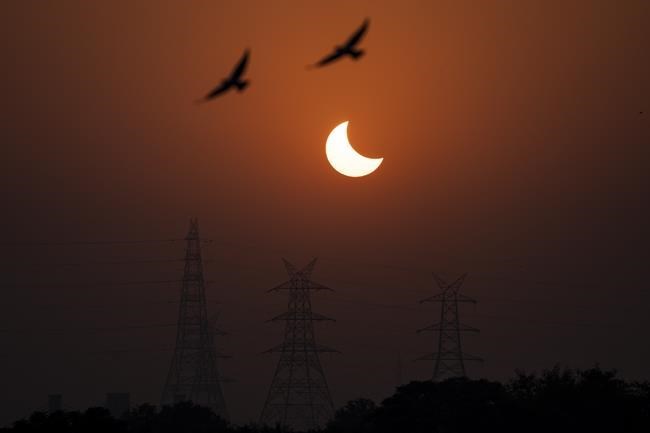VANCOUVER — Western British Columbia will be the best place in Canada to view a rare annular solar eclipse on Saturday, but cloudy skies could obscure the phenomenon for many viewers.
Gurveen Kaur, co-president of the University of B.C. Astronomy Club, said she was saddened, but not defeated, by the forecast.
"I think everyone's still hoping that they'll still get at least a glimpse of the eclipse throughout that hour-and-a-half window," she said in an interview Friday.
An annular solar eclipse occurs when the moon passes between the Earth and sun, and because it happens when the sun is at its farthest point from Earth, viewers are treated to a bright halo surrounding the black blot of the moon.
Areas of North America that will see the total eclipse and fiery ring include a path from Oregon to Texas, but a statement from the University of B.C. said Metro Vancouver residents will be able to see nearly 75 per cent of the eclipse beginning at 8:08 a.m. Pacific time.
The event will peak 72 minutes later when just a small sliver of the sun will be visible, and the eclipse will end at 10:38 a.m.
Kaur, who is studying political science at the University of B.C., said she became interested in astronomy around age seven when she first travelled outside city limits and saw the night sky without light pollution.
Her interest grew into a hobby once she attended university and joined the astronomy club, she said.
"It's just nice to have a community of people who are just as excited about space as I am."
Kaur said the club's goal is to make astronomy accessible as a hobby, and events like Saturday's partial solar eclipse are opportunities to attract newcomers.
"Solar eclipses are so rare, so we're really excited for this one and I'm really hoping that the weather clears up."
The University of B.C. and Kwantlen Polytechnic University are holding viewing events and offering telescopes and special glasses so amateur astronomers can safely watch the eclipse. There is potential for serious eye damage for those who look directly at the sun.
The weather could complicate those plans, with Environment Canada calling for clouds and showers for much of the south coast on Saturday.
UBC has said it will cancel its viewing party if clouds move in, but Kwantlen said its event will continue indoors at its Richmond campus with a livestream.
Scientists at both universities are hoping for a break in the weather.
“A partial solar eclipse is one of nature's great shows, and it's free," UBC physics and astronomy professor Douglas Scott said in the UBC statement.
Laura Flinn, a physics instructor at Kwantlen Polytechnic, said the university will also be offering other space-related indoor activities in the event bad weather spoils their view.
"There's a possibility in the forecast that the clouds will break before the eclipse is maximum," she said in an interview Friday. "So, if the forecast holds true, we should be able to move our telescopes and other equipment (outside)."
Flinn said the eclipse is an excellent way to spark a child's interest in astronomy and give them a sense of how big the universe is.
She said a similar event, held at UBC when she was in Grade 3, sparked her lifelong interest in the subject.
"That's why it's good to have young kids come in," she said, adding that it provides an opportunity to challenge and diversify the image children have of who can be scientist.
"We want (children) to know that there are also girls in lab coats around as well."
The last partial eclipse was visible across Metro Vancouver in August 2017. Flinn said between two and five eclipses occur around the world each year, but only those along the path of an eclipse are able to see it.
The next complete annular eclipse over southern British Columbia won't happen until Aug. 4, 2111, she said.
Central and Eastern Canada won't have long to wait for their peek at a solar eclipse.
The next one will happen on April 8, 2024, and will be viewable over parts of Ontario, Quebec, New Brunswick, Prince Edward Island and Newfoundland and Labrador.
Kaur said despite what happens Saturday, she and some friends are already planning to travel to see next year's complete eclipse.
"It's something that we don't want to miss. It's so rare, so to have it on the same continent you are on — we're just super excited."
This report by The Canadian Press was first published Oct. 13, 2023.
Brieanna Charlebois, The Canadian Press



